-
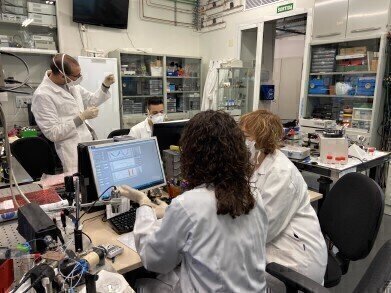 The CONVAT team working in their ICN2 Lab in Barcelona.
The CONVAT team working in their ICN2 Lab in Barcelona. -
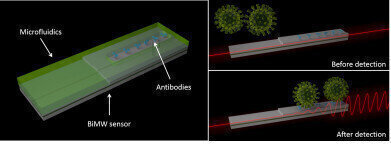 The interferometric biosensor.
The interferometric biosensor. -
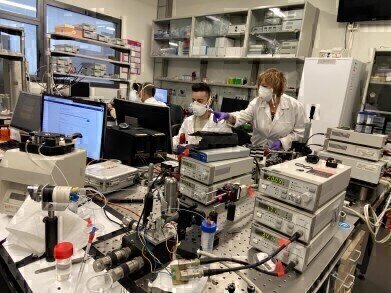
-
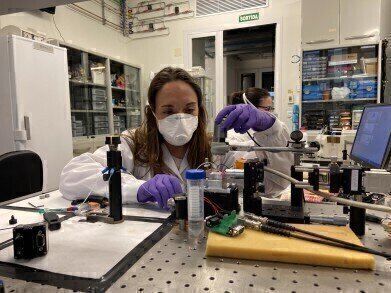
-
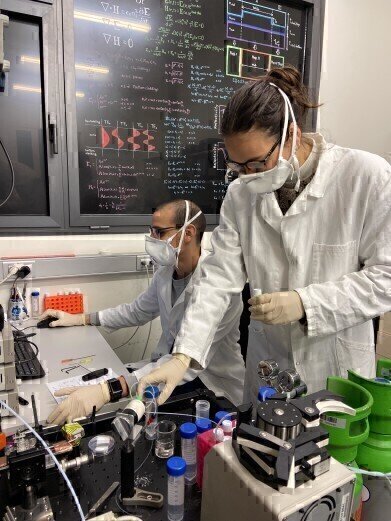
News & Views
New Saliva Test to Instantly Detect Coronavirus with Lasers
Apr 07 2020
Responding to the European Commission’s Express Calls to tackle the coronavirus pandemic, Photonics21 scientists are developing a new rapid, non-invasive ‘optical biosensor’ demonstrator that will detect Covid-19 in humans as soon as it is present in the body.
Having already created six working laboratory demonstrators for other applications, the research team says the technology still needs further adaptation and testing but could be available in a year at the latest.
Originally developed to look for bacterial infections or cancer biomarkers, the new ultrasensitive detector uses photonics to detect infections in patients with a small amount of the virus.
With the ability to diagnose in real-time with high specificity from a low concentration sample, the sensor is much more reliable than the coronavirus rapid-test, ‘finger-prick’ kit which detects if a person has had the coronavirus before and has since recovered.
Looking at tiny molecules, the new point-of-care detector examines virus antigens using miniaturised chips – or ‘nanophotonic biosensors’ - from a simple nasal or saliva swab.
Once a sample is prepared and is in place, the device confirms a positive or negative for coronavirus instantaneously. However, allowing for preparation time and analysis, a result - from sample to diagnosis - may take up to 30 minutes.
Calling themselves CONVAT and coordinated at ‘ICN2’ (the Catalan Institute of Nanoscience and Nanotechnology, Spain) the researchers have tested the demonstrators on patients’ samples provided by Vall D´Hebrón Hospital in Barcelona and several other hospitals in Spain for other pathologies.
Project coordinator, Professor Laura Lechuga said: “With thousands of deaths worldwide, we are in urgent need of a rapid new testing kit that is accurate, highly sensitive, non-invasive and cheap to produce.
“We are currently integrating all the instrumentation in a portable 25x15x25 cm box with a tablet control. At present, our detector is user-friendly, with the preparation being only technical expertise required, and could be widely deployed for GPs or nurses to test patients.
“Our nanosensor is capable of detecting RNA strands which will fully identify the new coronavirus.”
The detector works by looking at the ‘binding’ of the coronavirus molecules to the sensor surface - producing a new signal when the virus is present.
The CONVAT team use a Nano-Interferometric Biosensor, the most sensitive, label-free detection technology available in the world today, identifying at the molecular level.
Since the bioreceptors on the sensor surface are specifically ‘tuned’ to a particular antigen of the virus, only the coronavirus molecules are captured along the sensor.
Light travelling in the sensor generates an evanescent field of few nanometres over the sensor surface. Here, receptors (like antibodies or DNA strands) can recognise the antigens of the virus capsid, when a respiratory fluid sample passes through.
This recognition event produces a change in the refractive index, causing the light to slightly change its direction of travel.
This change can be measured and determined precisely against a set of existing values – and could give an instant diagnosis for coronavirus expected at the picomolar to attomolar (pM–aM) range without any need amplification.
Funded by Horizon 2020, the European Commission’s scientific research initiative, the scientists only began work on their detector at the start of March, in response to the pandemic.
More information online
Digital Edition
Lab Asia 31.2 April 2024
April 2024
In This Edition Chromatography Articles - Approaches to troubleshooting an SPE method for the analysis of oligonucleotides (pt i) - High-precision liquid flow processes demand full fluidic c...
View all digital editions
Events
Apr 22 2024 Marrakech, Morroco
Making Pharmaceuticals Exhibition & Conference
Apr 23 2024 Coventry, UK
Apr 23 2024 Kintex, South Korea
Apr 23 2024 Seoul, South Korea
Apr 24 2024 Jakarta, Indonesia







.jpg)









